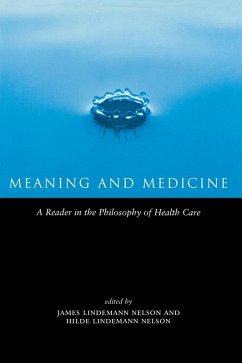- Gebundenes Buch
- Merkliste
- Auf die Merkliste
- Bewerten Bewerten
- Teilen
- Produkt teilen
- Produkterinnerung
- Produkterinnerung
A chief aim of this resource is to rekindle interest in seeing health care not solely as a set of practices so problematic as to require ethical analysis by philosophers and other scholars, but as a field whose scrutiny is richly rewarding for the traditional concerns of philosophy.
Andere Kunden interessierten sich auch für
![Bioethics Bioethics]() Stephen HollandBioethics33,99 €
Stephen HollandBioethics33,99 €![The Cultural Context of Therapeutic Choice The Cultural Context of Therapeutic Choice]() C. SargentThe Cultural Context of Therapeutic Choice81,99 €
C. SargentThe Cultural Context of Therapeutic Choice81,99 €![Medical Ethics, Ordinary Concepts and Ordinary Lives Medical Ethics, Ordinary Concepts and Ordinary Lives]() Christopher CowleyMedical Ethics, Ordinary Concepts and Ordinary Lives38,99 €
Christopher CowleyMedical Ethics, Ordinary Concepts and Ordinary Lives38,99 €![Bioethics Bioethics]() Stephen HollandBioethics81,99 €
Stephen HollandBioethics81,99 €![Happy-People-Pills for All Happy-People-Pills for All]() Mark WalkerHappy-People-Pills for All103,99 €
Mark WalkerHappy-People-Pills for All103,99 €![Positive Ethics for Mental Health Professionals Positive Ethics for Mental Health Professionals]() Sharon K. AndersonPositive Ethics for Mental Health Professionals58,99 €
Sharon K. AndersonPositive Ethics for Mental Health Professionals58,99 €![Nursing Ethics Nursing Ethics]() A. ArmstrongNursing Ethics38,99 €
A. ArmstrongNursing Ethics38,99 €-
-
-
A chief aim of this resource is to rekindle interest in seeing health care not solely as a set of practices so problematic as to require ethical analysis by philosophers and other scholars, but as a field whose scrutiny is richly rewarding for the traditional concerns of philosophy.
Hinweis: Dieser Artikel kann nur an eine deutsche Lieferadresse ausgeliefert werden.
Hinweis: Dieser Artikel kann nur an eine deutsche Lieferadresse ausgeliefert werden.
Produktdetails
- Produktdetails
- Verlag: Taylor & Francis
- Seitenzahl: 416
- Erscheinungstermin: 22. Juli 1999
- Englisch
- Abmessung: 254mm x 178mm x 24mm
- Gewicht: 934g
- ISBN-13: 9780415919159
- ISBN-10: 0415919150
- Artikelnr.: 25467609
- Herstellerkennzeichnung
- Libri GmbH
- Europaallee 1
- 36244 Bad Hersfeld
- gpsr@libri.de
- Verlag: Taylor & Francis
- Seitenzahl: 416
- Erscheinungstermin: 22. Juli 1999
- Englisch
- Abmessung: 254mm x 178mm x 24mm
- Gewicht: 934g
- ISBN-13: 9780415919159
- ISBN-10: 0415919150
- Artikelnr.: 25467609
- Herstellerkennzeichnung
- Libri GmbH
- Europaallee 1
- 36244 Bad Hersfeld
- gpsr@libri.de
James Lindemann Nelson is Professor of Philosophy at the University of Tennessee Medical Center in Knoxville. Hilde Lindemann Nelson is Director of the Center for Applied and Professional Ethics at the University of Tennessee, Knoxville, and is editor of Feminism andFamilies (Routledge 1997). They are the authors of ThePatient in the Family (Routledge 1995) and Alzheimer's:Answers to Hard Questions for Families (1996).
TABLE OF CONTENTS Section I. Metaphysics Introduction Readings 1: On the Distinction Between Disease and Illness
Christopher Boorse Chapter 2: The Disease of Masturbation: Values and the Concept of Disease
H. Tristram Englehardt Chapter 3: Free Will and the Genome Project
P. S. Greenspan Chapter 4: (In)Equality
(Ab)Normality and the ADA
Anita Silvers Chapter 5: Dworkin on Dementia: Elegant Theory
Questionable Policy
Rebecca Dresser Section II. Epistemology Introduction Readings 6: Knowing and Acting in Medical Practice: The Epistemological Politics of Outcomes Research
Sandra Tanenbaum Chapter 7: Clinical Judgment
Expert Programs
and Cognitive Style: A Counter-Essay in the Logic of Diagnosis
Marx Wartofsky Chapter 8: The Role of Decision Analysis in Informed Consent: Choosing Between Intuition and Systematicity
P.A. Ubel and G. Lowenstein Chapter 9: Incommensurability: Its Implications for the Patient/Physician Relationship
Robert Veatch and William Stempsey Chapter 10: Knowledge at the Bedside: A Feminist View of What's Happening to This Patient
Hilde Lindemann Nelson Section III. Ethics Introduction Readings Chap 11: How Medicine Saved the Life of Ethics
Stephen Toulmin Chapter 12: Getting Down to Cases: The Revival of Casuistry in Bioethics
John Arras Chapter 13: The 'Four-principles' Approach
Tom Beauchamp Chapter 14:
A Critique of Principlism
K. Danner Clouser andBernard Gert Chapter 15: Moving Forward in Bioethical Theory: Theories
Cases and Specified Principlism
David DeGrazia Chapter 16: From the Ethicist's Point of View: The Literary Nature of Ethical Inquiry
Tod Chambers Chapter 17: Why a Feminist Approach to Bioethics?
Margaret Little Section IV. Social Philosophy Introduction Readings 18: Health Care Needs and Distributive Justice
Norman Daniels Chapter 19: Moral Justice and Legal Justice in Managed Care: The Ascent of Contributive Justice
E. Havvi Morreim Chapter 20: Meeting the Challenge of Justice and Rationing
Norman Daniels
Frances Kamm
Eric Rakowski
John Broome
Mary Anne Bailey Chapter 21: Justice in the Allocation of Health Care Resources: A Feminist Account
Hilde Lindemann Nelson and James Lindemann Nelson Section V. Postmodernity Introduction Readings 22: Medical Practice and Social Authority
Robert B. Pippin Chapter 23: Christian Science
Rational Choice and Alternative World Views
Peggy DesAutels Chapter 24: 'Ambiguous Sex' or Ambivalent Medicine? Ethical Issues in The Treatment of Intersexuality
Alice Domurat Dregner Chaper 25: Keeping Moral Spaces Open
Margaret Walker Chapter 26: Letting the Deaf Be Deaf: Reconsidering the Use of Cochlear Implants in Prelingually Deaf Children
Robert A. Crouch Chapter 27: Research Bioethics in the Ugandan Context: A Program Summary
Sana Loue
David Okello
Medi Kawuma
Christopher Boorse Chapter 2: The Disease of Masturbation: Values and the Concept of Disease
H. Tristram Englehardt Chapter 3: Free Will and the Genome Project
P. S. Greenspan Chapter 4: (In)Equality
(Ab)Normality and the ADA
Anita Silvers Chapter 5: Dworkin on Dementia: Elegant Theory
Questionable Policy
Rebecca Dresser Section II. Epistemology Introduction Readings 6: Knowing and Acting in Medical Practice: The Epistemological Politics of Outcomes Research
Sandra Tanenbaum Chapter 7: Clinical Judgment
Expert Programs
and Cognitive Style: A Counter-Essay in the Logic of Diagnosis
Marx Wartofsky Chapter 8: The Role of Decision Analysis in Informed Consent: Choosing Between Intuition and Systematicity
P.A. Ubel and G. Lowenstein Chapter 9: Incommensurability: Its Implications for the Patient/Physician Relationship
Robert Veatch and William Stempsey Chapter 10: Knowledge at the Bedside: A Feminist View of What's Happening to This Patient
Hilde Lindemann Nelson Section III. Ethics Introduction Readings Chap 11: How Medicine Saved the Life of Ethics
Stephen Toulmin Chapter 12: Getting Down to Cases: The Revival of Casuistry in Bioethics
John Arras Chapter 13: The 'Four-principles' Approach
Tom Beauchamp Chapter 14:
A Critique of Principlism
K. Danner Clouser andBernard Gert Chapter 15: Moving Forward in Bioethical Theory: Theories
Cases and Specified Principlism
David DeGrazia Chapter 16: From the Ethicist's Point of View: The Literary Nature of Ethical Inquiry
Tod Chambers Chapter 17: Why a Feminist Approach to Bioethics?
Margaret Little Section IV. Social Philosophy Introduction Readings 18: Health Care Needs and Distributive Justice
Norman Daniels Chapter 19: Moral Justice and Legal Justice in Managed Care: The Ascent of Contributive Justice
E. Havvi Morreim Chapter 20: Meeting the Challenge of Justice and Rationing
Norman Daniels
Frances Kamm
Eric Rakowski
John Broome
Mary Anne Bailey Chapter 21: Justice in the Allocation of Health Care Resources: A Feminist Account
Hilde Lindemann Nelson and James Lindemann Nelson Section V. Postmodernity Introduction Readings 22: Medical Practice and Social Authority
Robert B. Pippin Chapter 23: Christian Science
Rational Choice and Alternative World Views
Peggy DesAutels Chapter 24: 'Ambiguous Sex' or Ambivalent Medicine? Ethical Issues in The Treatment of Intersexuality
Alice Domurat Dregner Chaper 25: Keeping Moral Spaces Open
Margaret Walker Chapter 26: Letting the Deaf Be Deaf: Reconsidering the Use of Cochlear Implants in Prelingually Deaf Children
Robert A. Crouch Chapter 27: Research Bioethics in the Ugandan Context: A Program Summary
Sana Loue
David Okello
Medi Kawuma
TABLE OF CONTENTS Section I. Metaphysics Introduction Readings 1: On the Distinction Between Disease and Illness
Christopher Boorse Chapter 2: The Disease of Masturbation: Values and the Concept of Disease
H. Tristram Englehardt Chapter 3: Free Will and the Genome Project
P. S. Greenspan Chapter 4: (In)Equality
(Ab)Normality and the ADA
Anita Silvers Chapter 5: Dworkin on Dementia: Elegant Theory
Questionable Policy
Rebecca Dresser Section II. Epistemology Introduction Readings 6: Knowing and Acting in Medical Practice: The Epistemological Politics of Outcomes Research
Sandra Tanenbaum Chapter 7: Clinical Judgment
Expert Programs
and Cognitive Style: A Counter-Essay in the Logic of Diagnosis
Marx Wartofsky Chapter 8: The Role of Decision Analysis in Informed Consent: Choosing Between Intuition and Systematicity
P.A. Ubel and G. Lowenstein Chapter 9: Incommensurability: Its Implications for the Patient/Physician Relationship
Robert Veatch and William Stempsey Chapter 10: Knowledge at the Bedside: A Feminist View of What's Happening to This Patient
Hilde Lindemann Nelson Section III. Ethics Introduction Readings Chap 11: How Medicine Saved the Life of Ethics
Stephen Toulmin Chapter 12: Getting Down to Cases: The Revival of Casuistry in Bioethics
John Arras Chapter 13: The 'Four-principles' Approach
Tom Beauchamp Chapter 14:
A Critique of Principlism
K. Danner Clouser andBernard Gert Chapter 15: Moving Forward in Bioethical Theory: Theories
Cases and Specified Principlism
David DeGrazia Chapter 16: From the Ethicist's Point of View: The Literary Nature of Ethical Inquiry
Tod Chambers Chapter 17: Why a Feminist Approach to Bioethics?
Margaret Little Section IV. Social Philosophy Introduction Readings 18: Health Care Needs and Distributive Justice
Norman Daniels Chapter 19: Moral Justice and Legal Justice in Managed Care: The Ascent of Contributive Justice
E. Havvi Morreim Chapter 20: Meeting the Challenge of Justice and Rationing
Norman Daniels
Frances Kamm
Eric Rakowski
John Broome
Mary Anne Bailey Chapter 21: Justice in the Allocation of Health Care Resources: A Feminist Account
Hilde Lindemann Nelson and James Lindemann Nelson Section V. Postmodernity Introduction Readings 22: Medical Practice and Social Authority
Robert B. Pippin Chapter 23: Christian Science
Rational Choice and Alternative World Views
Peggy DesAutels Chapter 24: 'Ambiguous Sex' or Ambivalent Medicine? Ethical Issues in The Treatment of Intersexuality
Alice Domurat Dregner Chaper 25: Keeping Moral Spaces Open
Margaret Walker Chapter 26: Letting the Deaf Be Deaf: Reconsidering the Use of Cochlear Implants in Prelingually Deaf Children
Robert A. Crouch Chapter 27: Research Bioethics in the Ugandan Context: A Program Summary
Sana Loue
David Okello
Medi Kawuma
Christopher Boorse Chapter 2: The Disease of Masturbation: Values and the Concept of Disease
H. Tristram Englehardt Chapter 3: Free Will and the Genome Project
P. S. Greenspan Chapter 4: (In)Equality
(Ab)Normality and the ADA
Anita Silvers Chapter 5: Dworkin on Dementia: Elegant Theory
Questionable Policy
Rebecca Dresser Section II. Epistemology Introduction Readings 6: Knowing and Acting in Medical Practice: The Epistemological Politics of Outcomes Research
Sandra Tanenbaum Chapter 7: Clinical Judgment
Expert Programs
and Cognitive Style: A Counter-Essay in the Logic of Diagnosis
Marx Wartofsky Chapter 8: The Role of Decision Analysis in Informed Consent: Choosing Between Intuition and Systematicity
P.A. Ubel and G. Lowenstein Chapter 9: Incommensurability: Its Implications for the Patient/Physician Relationship
Robert Veatch and William Stempsey Chapter 10: Knowledge at the Bedside: A Feminist View of What's Happening to This Patient
Hilde Lindemann Nelson Section III. Ethics Introduction Readings Chap 11: How Medicine Saved the Life of Ethics
Stephen Toulmin Chapter 12: Getting Down to Cases: The Revival of Casuistry in Bioethics
John Arras Chapter 13: The 'Four-principles' Approach
Tom Beauchamp Chapter 14:
A Critique of Principlism
K. Danner Clouser andBernard Gert Chapter 15: Moving Forward in Bioethical Theory: Theories
Cases and Specified Principlism
David DeGrazia Chapter 16: From the Ethicist's Point of View: The Literary Nature of Ethical Inquiry
Tod Chambers Chapter 17: Why a Feminist Approach to Bioethics?
Margaret Little Section IV. Social Philosophy Introduction Readings 18: Health Care Needs and Distributive Justice
Norman Daniels Chapter 19: Moral Justice and Legal Justice in Managed Care: The Ascent of Contributive Justice
E. Havvi Morreim Chapter 20: Meeting the Challenge of Justice and Rationing
Norman Daniels
Frances Kamm
Eric Rakowski
John Broome
Mary Anne Bailey Chapter 21: Justice in the Allocation of Health Care Resources: A Feminist Account
Hilde Lindemann Nelson and James Lindemann Nelson Section V. Postmodernity Introduction Readings 22: Medical Practice and Social Authority
Robert B. Pippin Chapter 23: Christian Science
Rational Choice and Alternative World Views
Peggy DesAutels Chapter 24: 'Ambiguous Sex' or Ambivalent Medicine? Ethical Issues in The Treatment of Intersexuality
Alice Domurat Dregner Chaper 25: Keeping Moral Spaces Open
Margaret Walker Chapter 26: Letting the Deaf Be Deaf: Reconsidering the Use of Cochlear Implants in Prelingually Deaf Children
Robert A. Crouch Chapter 27: Research Bioethics in the Ugandan Context: A Program Summary
Sana Loue
David Okello
Medi Kawuma








